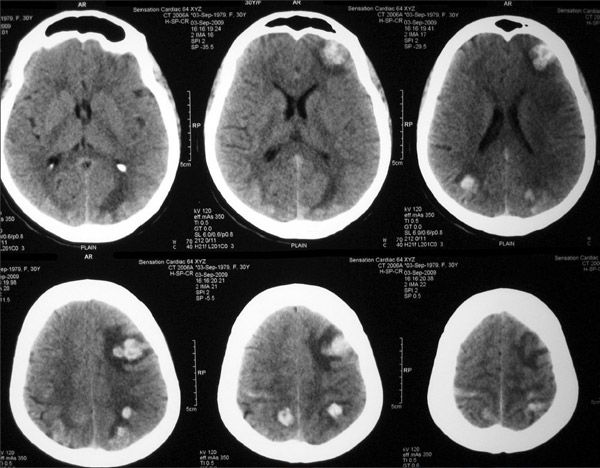
All iLive content is medically reviewed or fact checked to ensure as much factual accuracy as possible.
We have strict sourcing guidelines and only link to reputable media sites, academic research institutions and, whenever possible, medically peer reviewed studies. Note that the numbers in parentheses ([1], [2], etc.) are clickable links to these studies.
If you feel that any of our content is inaccurate, out-of-date, or otherwise questionable, please select it and press Ctrl + Enter.
Brain metastasis
Medical expert of the article
Last reviewed: 04.07.2025

Malignant tumors remain one of the most unpredictable diseases to this day. Very often, with a weakened body and a progressive disease, a malignant tumor can spread with the blood and lymph flow to other internal organs of a person. A new tumor, called "metastases", can begin to develop from the transferred cells. The organs most susceptible to metastases are the lungs, liver, bones and brain. Moreover, treatment of metastases in the latter case is the most difficult.
Brain cancer metastases
Lung and breast cancers most often result in brain metastases. Autopsies of patients who died from lung or breast cancers show that brain metastases occur in about 30% of patients. At the same time, the percentage of simultaneous detection of cancer and metastases is very small - at the level of 1%, which once again emphasizes the fact that metastases occur during the progression of a malignant tumor. The treatment process is complicated by the fact that there is absolutely no relationship between the initial stage of the detected cancer and the appearance of metastases. Metastases can appear both at the beginning of the development of a malignant tumor, and at later stages, or they may not appear at all. Everything depends only on the unique physiological characteristics of the human body.
Brain cancer metastases are the most serious complications in cancer treatment and significantly affect the outcome of treatment and the patient's life expectancy.
Symptoms of brain metastases
Symptoms of brain metastases depend on the location of the lesion. In general, signs of brain metastases include changes in body sensation and impaired coordination, rapid changes in emotional state, headaches, sometimes accompanied by fever, personality changes and memory loss, lethargy, different sizes of eye pupils, speech difficulties and general weakness of the body. If the frontal part is affected, frontal psyche (a sharp change to rude behavior) can also be observed. The person begins to swear, cling to others, visual functions and movements of the musculoskeletal system are impaired. Although the symptoms of brain metastases are purely individual specific and can sometimes change the physical and behavioral reactions of the body beyond recognition. At the first appearance of symptoms, you should immediately contact your doctor, so as not to have even greater complications associated with the patient's mental health.
Melanoma metastases to the brain
Speaking about cancer metastases, it is worth mentioning the most severe type of oncological disease – melanoma. Melanoma, or skin cancer, begins to form metastases in the internal organs of a person faster than other forms of diseases and after that becomes practically incurable. Most often, melanoma gives metastases to the brain, lungs and bones. The lymph nodes of the human body are also susceptible to metastases. In any case, it is necessary to monitor more carefully and try to prevent the rapid development of such a disease as melanoma.
The most susceptible to the disease are people with a large number of moles, freckles, other reactions to solar activity on their bodies, or simply those whose lifestyle is associated with frequent exposure to direct sunlight. If you notice frequent formation of new moles on your body and their rapid growth to a diameter of more than 7 mm, you should immediately consult a doctor, since, let us remind you, skin cancer very quickly metastasizes and becomes incurable.
Melanoma metastases to the brain significantly reduce the patient's chances of survival. However, in some cases, treatment with monoclonal antibodies can help even at the metastasis stage. Everything depends on the development of the disease and the individual characteristics of the human body.
According to pathologists, about 45% of all cancer patients have metastases to the brain, and more often than not, they are the cause of death rather than cancer itself. 60% of metastasis cases are lung cancer. Next come breast cancer, melanoma, and colon cancer. These diseases can metastasize to the brainstem, which significantly complicates treatment and produces a number of specific symptoms: intracranial headaches of a bursting and dull nature appear, which can lead to dizziness and visual impairment. Metastases in the brainstem can also cause a constant feeling of nausea and vomiting, as well as a convulsive symptom, very similar in manifestation to epilepsy.

Treatment of brain metastases
Treatment of brain metastases depends on the degree of metastasis. Thus, neurosurgical interventions are used to form up to three foci of metastases in the brain. However, if the metastases are located in places inaccessible to surgery, other methods of treatment should be used. Given the complexity of the situation and the work directly with the brain, with such operations, the probability of relapse after surgery is very high - from 10% to 50%. To reduce the probability of relapse, brain irradiation is also performed before the operation, which, however, can also have its consequences.
In case of multiple metastases in the brain, it is possible to use chemotherapy. But its possibilities in case of multiple metastases in the brain are significantly limited due to the blood-brain barrier, which does not allow most cytostatics to pass. Of course, there are drugs that overcome the barrier, but they, unfortunately, are not always effective in case of metastasis.
Today, the most progressive and effective method of treating brain metastases is the method of stereotactic radiosurgery, or gamma knife. The treatment procedure is reduced to remote irradiation of the main foci of metastases in the brain. The effectiveness of such treatment is 90%, but even this does not help to save the lives of patients for more than a year. The progress of the primary focus leads to death, and not the metastases that arose as a result of its development. Thus, life expectancy with metastases in the brain is not great, since even complete removal of metastases does not lead to a person's recovery. The development of metastases can be observed in most patients with cancer aged 50 to 70 years. They are most often given a prognosis for the development of metastases, provided that the cancer continues to develop.
Thus, brain metastases are a very serious clinical consequence of cancer development, which reduces the chances of recovery and avoiding death. At the first suspicion of metastases, you should immediately consult with your doctor in order to prevent cancer progression and metastasis.


 [
[